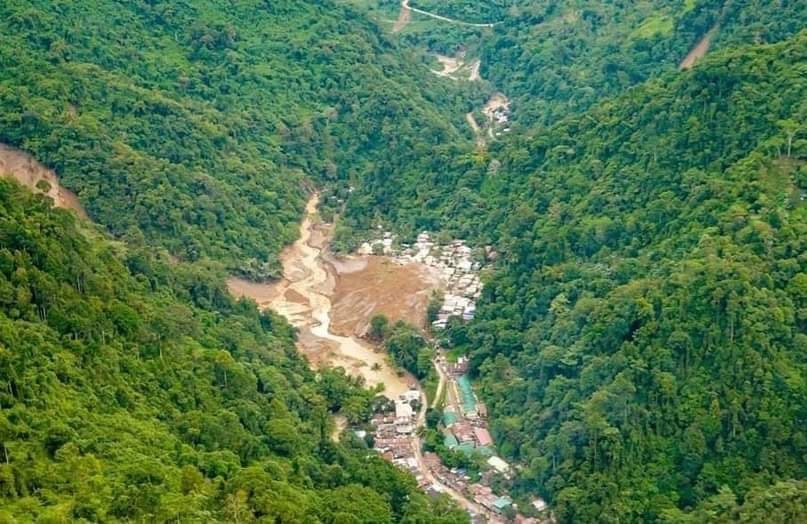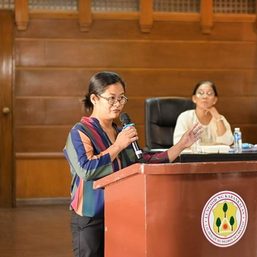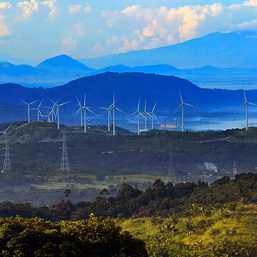SUMMARY
This is AI generated summarization, which may have errors. For context, always refer to the full article.

MANILA, Philippines – APEX Mining, the company operating the gold mine in Maco town, Davao de Oro province near the site of the disastrous February 6 landslide, said it intended to stay in the ill-starred area and had no plans to halt operations despite protests from environmental groups.
“While the recent landslide tested our resilience, it also strengthened our commitment to help our hosts and [impacted] barangays build a better fortress against the threats of nature,” said Luis Sarmiento, president and CEO of APEX Mining Company Incorporated (AMCI), during a hearing at the House of Representatives on Tuesday, March 12.
He added: “As our 54-year history has shown, we are here for the long haul.”
Sarmiento also told the members of the House committee on disaster resilience that AMCI follows sustainability mining practices and international standards on safety and transparency. Aside from rescue operations, they have also provided the local government a temporary relocation site, Sarmiento said.
“Much remains to be done. We continue leveling the ground zero and helping the evacuees go back to their normal lives. We have lent our property in Malamodao to the LGU as a temporary relocation facility.”
The landslide at Barangay Masara in Maco town killed at least 98 residents including nine mining employees. It happened just 570 meters from the mining site’s gate and two to three kilometers from active mine operations.
Environmental groups said that AMCI must be held responsible for what happened and demanded an investigation into the link between mining operations and recurring landslides in Maco town.
Gabriela Representative Arlene Brosas said large-scale mining destroys not only the environment, but kills workers and deprives people of their homes. She called on the administration to “suspend all large-scale mining companies in the country to prevent the destruction of our environment.”
“Mamamayan ang bumabalikat sa matinding epekto ng large-scale mining habang ang malalaking kumpanya ay patuloy na kumikita,” Brosas said.
(It’s the people who bear the brunt of the harsh effects of large-scale mining, while huge companies rake in the profits.)
Status quo
While AMCI continues operations, progress in permanently relocating residents away from the landslide-prone areas is slow.
The disaster renewed discussions on the implementation of the Mines and Geosciences Bureau’s (MGB) recommendation to declare the landslide prone area as a no-build zone.
During the hearing, the MGB said that while they have been doing regular geohazard assessments since 2008, they could only make recommendations to the local government.
Meanwhile, Maco Mayor Voltaire Rimando said MGB permitted the local government through geohazard certificates to rebuild the Masara Integrated School in 2017 and a new barangay hall in 2021.
“We consulted the stakeholder concerned, such as the MGB, to ensure that opening the school in the geohazard area will be safe…as a result Masara Integrated School resumed its classes after 9 years,” said Rimando.
“In 2021, [a new] barangay hall was established in Zone 1 which is the ground zero of 2008. The same was cleared in the MGB.”
Before that, in 2011, Rimando said the barangay council of Masara submitted before them an adopted resolution urging the local government to allow the displaced residents to return to their homes. Attached to the resolution is a signature petition from the displaced residents. At that time, Rimando said “the Sangguniang Bayan decided not to act on this matter.”
Despite the geohazard certificates presented by Rimando during the hearing, Cagayan de Oro 2nd District Representative Rufus Rodriguez said that responsibility still falls on the local government to protect its people.
Rodriguez said the MGB does not have police power, and the local government has autonomy. “The power…is in the Sanggunian,” said Rogriguez. “It is your obligation not to allow any building.” – Rappler.com
Add a comment
How does this make you feel?





















There are no comments yet. Add your comment to start the conversation.